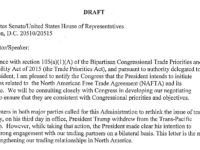The leak of the draft notice from the Trump Administration on the NAFTA renegotiation, which identifies at least 40 issues, will serve as the starting point for discussions once talks begin. Coverage of the U.S. interests has emphasized tariff issues, rules of origin, and tax treatment, but the digital issues should not be overlooked. The U.S. starting position looks a lot like the TPP, which suggests that we already have a very clear understanding of the text that U.S. negotiators will propose. This post unpacks some of the general language to decipher what the U.S. has in mind on intellectual property issues. A second post will review the other digital issues, including privacy and e-commerce rules.
Post Tagged with: "digital locks"
Canadian DMCA in Action: Court Awards Massive Damages in First Major Anti-Circumvention Copyright Ruling
The Federal Court of Canada has issued a massive damage award in the first major Canadian digital lock copyright ruling involving circumvention of technological protection measures. The ruling, which is the first to conduct an extensive examination of the anti-circumvention rules established in 2012, adopts expansive interpretations to the digital lock protections and narrow views of the exceptions. The case confirms that Canada has tough anti-piracy laws with one of the most aggressive digital lock laws in the world and will fuel calls to re-examine the effectiveness of the anti-circumvention exceptions in the 2017 copyright review.
House of Commons Fast Tracks Copyright Bill To Implement Marrakesh Treaty
Bill C-11, the copyright bill that will allow Canada to accede to an international copyright treaty that will improve access for the blind and visually impaired, was fast tracked on Tuesday with unanimous approval to consider the bill read, studied, and passed three times. There will be no House of Commons committee hearings on the bill, which now heads to the Senate for approval. The bill received first reading at the Senate today. With no hearings and little debate, the bill will pass quickly without any changes. I wrote about Bill C-11 last month, noting that it is a positive step forward but that some provisions may be unduly restrictive when compared to the implementation approach recommended by some copyright groups.
One of the most notable provisions (which was raised by Carla Qualtrough, the Minister of Sport and Persons with Disabilities) is that the bill amends Canada’s anti-circumvention rules by expanding the exception on digital locks. NDP MP Charlie Angus, a veteran of the copyright battles on Parliament Hill, seized on the issue to ask whether the government would address the remaining digital lock restrictions. The answer from Minister Qaultrough: yes.
The Trouble With the TPP, Day 38: Limits on Canadian Digital Lock Safeguards
As part of the contentious debate over the implementation of anti-circumvention rules in Canadian copyright law in 2012, the government tried to assure concerned stakeholders that it had established specific mechanisms within the law to create additional exceptions to the general rule against circumvention. The law includes a handful of exceptions for issues such as security or privacy protection, but there is also a process for adding new limitations to the general rule. There are two possible avenues for new limitations and exceptions. First, Section 41.21(1) allows the Governor in Council to make regulations for an exception where the law would otherwise “unduly restrict competition.” Second, Section 41.21(2)(a) identifies other circumstances to consider for new regulations for exceptions including whether the circumvention rules could adversely affect the fair dealing criteria.
In addition to those two potential regulation making models for new exceptions and limitations, Canadian law also establishes the possibility of creating a positive requirement on rights holders to unlock their locked content. It states that the Governor in Council may make regulations:
The Trouble With the TPP, Day 37: Breaking Digital Locks For Personal Purposes
The Trouble with the TPP series has featured several posts on the impact of the agreement on copyright law, including copyright term extension and changes to the digital lock rules. The potential changes to Canadian copyright law do not end there, however. For the next three days, I will focus on concerns arising from the TPP’s damages provisions that might restrict future Canadian copyright policies or require legislative change.
The first involves the TPP damages requirements associated with the anti-circumvention rules. As with many aspects of the TPP, the rules get very complicated, very quickly. The analysis starts with the TPP requirements. Article 18.68 establishes the rules for technological protection measures. The mandatory penalties for circumvention can be found in Article 18.84 (17):











